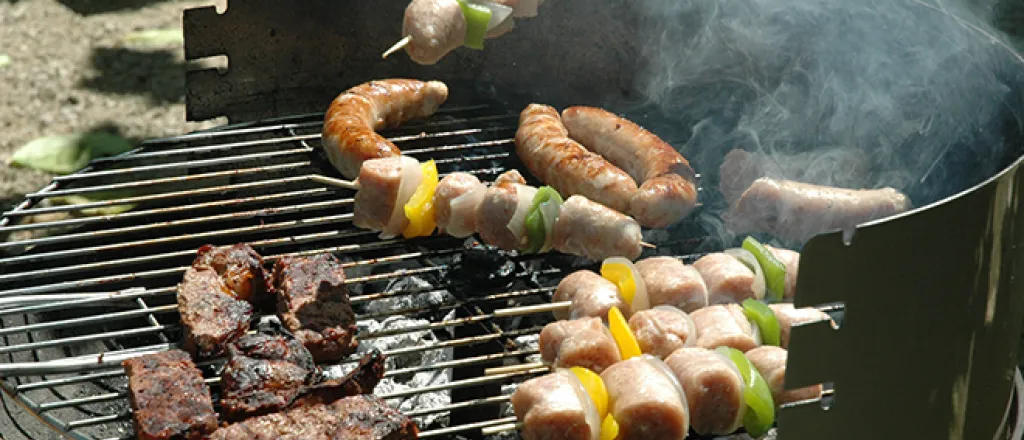
This 4th of July grills across America will be fired up for cookouts. On this edition of Agriculture USA Gary Crawford has some tips from an expert on how to keep cookouts from being sickouts. Gary Crawford has more.
PARTICIPANTS: Gary Crawford and Meredith Carothers, food safety expert with USDA's Meat and Poultry Hotline.
The USDA's Meat and Poultry Hotline number is 888-MPHOTLINE (888-674-6854) or go online to Ask.usda.gov
Transcript
(music) Oh yes, it is coming and those outdoor grills are going to be put to good use.
But while many Fourth of July celebrations will end with fireworks, yes, some of them will end with people getting sick from food poisoning. (screaming) Coming up, some ways to try and keep that "Ahh" thing from happening.
On this edition of Agriculture USA, I'm Gary Crawford.
You know, actually we should not be treating the subject of food poisoning lightly, the symptoms of which can vary greatly.
It can be as simple as just kind of a tummy cramp and going to the bathroom, but it could also be as severe as causing death, and that's what's really scary.
That's Meredith Carruthers, food safety expert with the Agriculture Department's Meat and Poultry Hotline, the number of which we'll give you in a minute.
She says one of the big mistakes that we make when grilling meats and poultry is not using a meat thermometer to make sure the food is cooked to a high enough internal temperature to kill any bacteria that might be in or on that food.
Grilling kind of adds a coloring to the outside of a food product and makes it look done a lot of times way before it actually is fully done, and that really makes food thermometers super important.
And also important, of course, is knowing what temperatures to cook various foods to kill any bacteria, and we hope you're taking notes on this, so here we go.
For a whole cut of beef, pork, lamb, veal, things like steak, cook to a temperature of 145 degrees Fahrenheit.
Any fish, also 145.
Ground beef, veal, lamb, and pork, cook those to 160.
Any poultry, you know, chicken, turkey, duck, whether it's whole or ground, you want to cook those to 165.
So if you're doing a beef burger, 160, but if you're doing a turkey burger, 165.
If for some reason now you didn't get that memorized, just go online and search USDA recommended safe cooking temperatures and they'll pop up for you.
Of course, proper cooking is just one aspect of safe cookouts.
There are many, many others, such as using one set of utensils and platters to handle the raw meats going onto the grill, using another set of clean utensils and platters to handle the cooked product, and making sure that raw meats and their juices never touch any other food items that won't be cooked, things like salads and other ready-to-eat foods.
However, there are two very important things that many people are either ignoring or just don't realize how important they are in helping to keep people safe from food-related illnesses.
♪ Hand jive ♪ Hand jive.
♪ Hand jive ♪ Yes.
♪ Doin' that pretty hand jive ♪ Yes, you got the jive.
It's our hands.
And Meredith says in a cookout situation or any time raw meat and poultry is involved, we need to be washing our hands a lot.
And you know what?
We don't do it.
The USDA put dozens of people in test kitchens a while back, had them prepare a turkey burger and a salad, and they just watched everything they did. 97 percent of the time, people didn't either wash their hands at all or didn't do all five steps of hand washing for a full 20 seconds.
Oh, wow.
Those test subjects were spreading bacteria all over everything.
It's a fact that most people don't know, but this next fact, very crucial for us.
Certain bacteria can live on surfaces for like 72 hours.
Three days.
Think about it.
You're making dinner.
You've touched chicken, touched your spice containers without washing your hands, and then in the morning you're cooking eggs and you want to use the same spice in your eggs.
Then that gets all touched other places.
So yeah, it's just crazy what your hands can move around.
Oh, yeah.
And think about this.
It's gross.
Some people, especially people my age, love using their phones for recipes, and you could be touching your phone with bacteria from a raw meat product and then not sanitizing your phone, and then you just go on with your regular life, touching everything with your phone.
Ooh, so Meredith says we need to wash our hands before we start any food prep and immediately after we've touched any raw meat or poultry product or the juices from them.
Hand washing can help prevent food poisoning, which can cause quite a lot of discomfort.
But it could also be as severe as causing death.
So if you want to talk to an expert about any of this, here's how to do it.
So if you want to talk to a live food safety expert, you can call us on the Meat & Poultry hotline.
We're open Monday through Friday from 10 a.m. to 6 p.m. Eastern Time.
You can reach us at the phone at 1-888-674-6854.
So it's 1-888-MP-HOTLINE.
You can also live chat with us, same time, Monday through Friday, 10 a.m. to 6 p.m. Eastern Time, at ask.usda.gov.
If you have any questions, you know, when we're not open or not available live, you can send us an email at mphotline@usda.gov.
♪ It's the Fourth of July ♪
Yes, this has been Agriculture USA, Fourth of July version.
I'm Gary Crawford, reporting for the U.S. Department of Agriculture.
Have a great and safe Fourth of July.
[MUSIC PLAYING]








